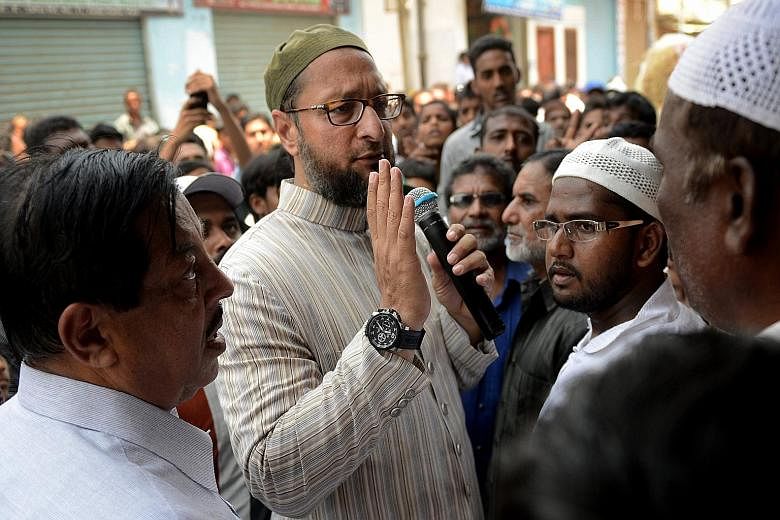Mr Asaduddin Owaisi heads the All India Majlis-e-Ittehadul Muslimeen (AIMIM) party with a small presence in India's south and west, but now plans to move into the eastern state of Bihar, unnerving the larger Congress party and its allies.
The tall, bespectacled, bearded politician known for his fiery speeches recently announced that the AIMIM would contest two dozen seats in a part of Bihar that is around 46 per cent Muslim.
With 40 seats in Parliament, Bihar is a politically important state where Prime Minister Narendra Modi's Bharatiya Janata Party (BJP) is allied with the Congress and two regional parties.
Mr Owaisi's critics have accused him of entering Bihar to fragment its Muslim vote, polarising voters along religious lines. But he denies the charge, even as the move has further raised his political star.
"This is the mindset - that Muslims should play a secondary role, a side role," he told The Straits Times. "Those days are gone. We want to expand our party... There is nothing wrong with that."
Mr Owaisi, already a three-time Member of Parliament at age 46, hails from a well-off family that has been in politics in his Hyderabad home town for three generations.
His family also runs educational institutes there through a trust that has Mr Owaisi, the eldest of three brothers, as its chairman.
After completing his education at Nizam College in Hyderabad, he studied law in Britain where he became a barrister of law at London's Lincoln's Inn.
But Mr Owaisi gave up law for politics, following in the footsteps of his father, Sultan Salahuddin Owaisi, a six-time MP, and grandfather, Mr Abdul Wahed Owaisi, who established the AIMIM in Hyderabad.
Mr Owaisi became a member of the Andhra Pradesh legislative assembly in 1994 and, by 2004, he was in the federal Parliament.
Still it has only been in the past year that Mr Owaisi, a devout Muslim whose special interests include reading books on history and religion, has come into greater national prominence as the rise of Hindu nationalist groups has shaken India's Muslim community.
Muslims make up 14 per cent of India's population but have only 4 per cent representation in Parliament with 22 MPs among the 543 members, down from 33 in the previous Parliament.
The community also scores low on all social and economic indicators, from education to employment. A 2010 survey by the National Council of Applied Economic Research said that three out of 10 Muslims lived below the poverty line.
Against this backdrop, Mr Owaisi, who is comfortable in English, Urdu and Hindi, and his firebrand style of politics are catching the ear of many Indian Muslims.
In October last year, he won two assembly seats in Maharashtra, then made a mark in local council elections. He is also building up his party in the northern state of Uttar Pradesh for the 2017 elections.
"Maharashtra... gave us a platform to expand our party and we are trying out best," said Mr Owaisi. "I don't know how successful I will be."
He said that the only way to empower the Muslim community is through greater political representation.
"Whether you like it or not, the crude and crass reality of India is that anyone who has a political voice has a share in development," he said. "Steps need to be taken to bring out the Muslim community from the economic and social abyss. One of the ways of doing it is through more political representation at each level - Parliament, state, municipal."
Traditionally, Muslim leaders have been part of political parties like the Congress or regional parties like Bihar's Rashtriya Janata Dal. There are even a few in the BJP.
But Mr Owaisi stands out in trying to forge his own space in national politics without tying up with any party, say analysts.
Even labels make him uncomfortable - he has been touted as everything from the "poster boy" to the "superstar" of the Muslim community for aggressively taking up issues that affect it.
When right-wing Hindu outfits close to the BJP launched a homecoming campaign to convert Christians and Muslims back to Hinduism, Mr Owaisi countered by saying that Islam is the "real home" of all.
When Yakub Memon was hanged for planning terrorist bombings in 1993 in Mumbai that killed 257 people, Mr Owaisi asked why the "perpetrators" accused of demolishing the Babri mosque that fuelled the incident had not been punished and whether they would be hanged too.
Political analyst Bhaskara Rao said: "There is a vacuum among the Muslim leadership and he is filling that vacuum."
But Mr Kamal Faruqui of the All-India Muslim Personal Law Board and a former chairman of the Delhi Commission for Minorities feels that Mr Owaisi needs to appeal to groups beyond Muslims to emerge as a national leader.
"He has to be seen as a secular politician," he said.
Nevertheless, Mr Owaisi has no plans to tone it down.
"If I feel this has to be said and this is right thing, I will say it. I cannot always try to be 'politically right'," he said.
"If someone says I am a fakir (religious ascetic), I am happy in that it allows me to say uncomfortable things. You have to speak the truth."

